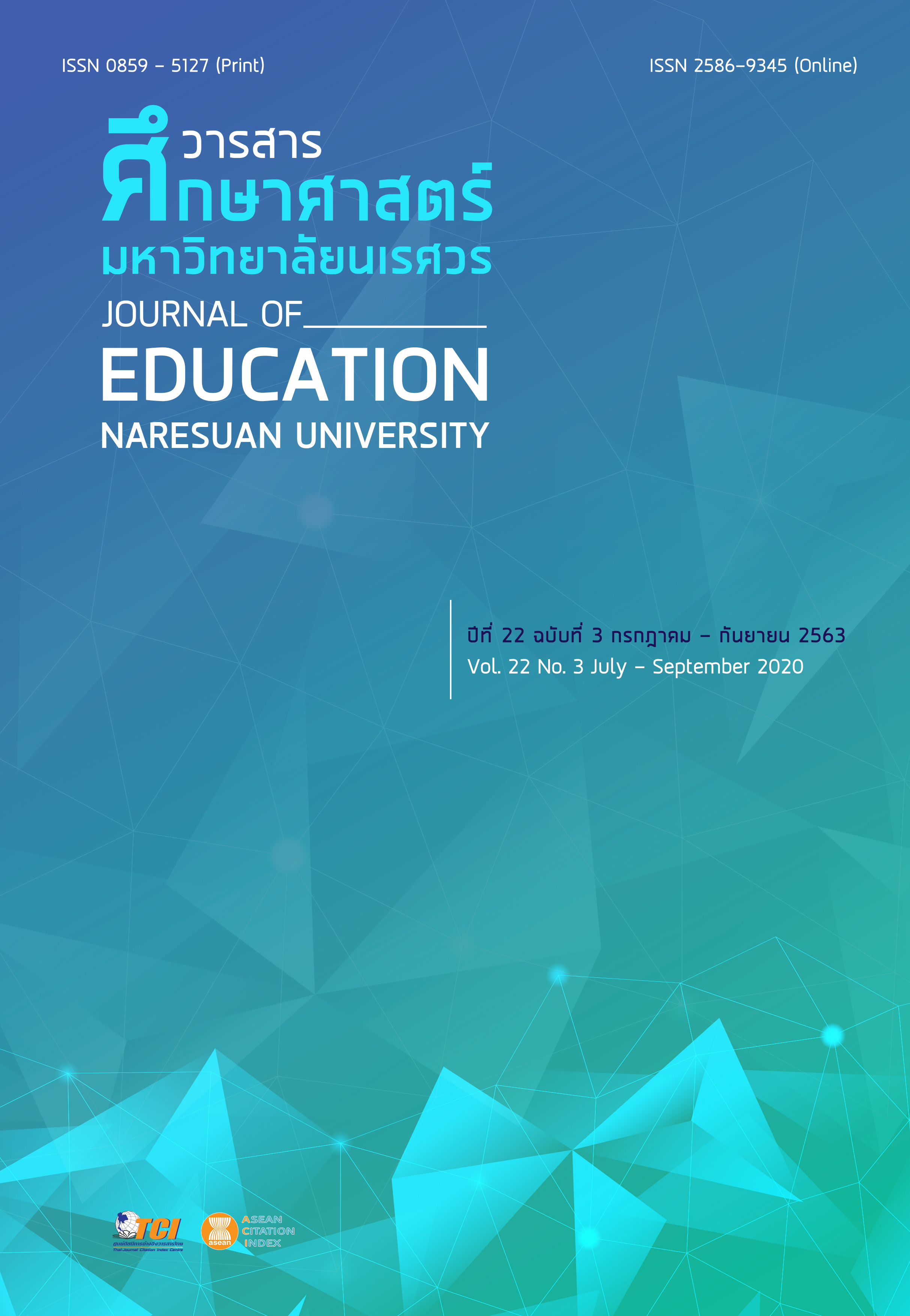THE CURRICULUM DEVELOPMENT OF THE THAM LUANG KHUN NAM NANG NON CAVE BY COACHING PROCESS การพัฒนาหลักสูตรถ้ำหลวง ขุนน้ำนางนอน ด้วยกระบวนการโค้ช
Main Article Content
Abstract
Tham Luang Khun Nam Nang Non Cave Rescue Operation was well- known around the world in 2018. Nowadays, it will not be only a legend but it will be alive and to be told again to students by this developed curriculum. The objective aims to 1) develop and evaluate the Tham Luang Khun Nam Nang Non curriculum by coaching process and 2) study teachers’ awareness and their perspective after participating into the curriculum proposing activities by coaching process. The target group was teachers at Ban Jong School, Mae Sai District, Chiang Rai Province. Research instruments were lesson plan for training teachers by using coaching process; protocols for focus group discussion of experts, semi- structured interview. Data were analyzed by content analysis. The results can be summarized as follows:
1. The Tham Luang Khun Nam Nang Non of Ban Jong School was developed as an integrated curriculum and it was planned as learner development activities for grade 5 students. The curriculum was divided into 6 units; 1) interesting Tham Luang, 2) Tham Luang rescue operation, 3) heroes of Tham Luang, 4) mindfulness and compassion for disaster survival, 5) survival from cave trapping and others natural disaster, and 6) realize the value and preservation of Tham Luang. The curriculum was verified its quality with the concurrence of the experts by focus group discussion for assessing suitability. It revealed the quality of the curriculum at good level. Then, activities, timing, and materials were revised before implementation.
2. Teachers showed their awareness on being story tellers of Tham Luang Khun Nam Nang Non Cave Rescue Operation to their students through the curriculum, they have the power of positive thinking and growth mindset toward giving hands for proposing the Tham Luang Khun Nam Nang Non curriculum for their student school and community.
Article Details
The owner of the article does not copy or violate any of its copyright. If any copyright infringement occurs or prosecution, in any case, the Editorial Board is not involved in all the rights to the owner of the article to be performed.
References
Anunthavorasakul, A. (2018). Disaster survival curriculum to help children for emergencies. Retrieved August 5, 2018, from https://news.thaipbs.or.th/content/273324 [in Thai]
Boonyanuwat, R. (2018). Lesson learned from Tham Luang cave rescue. Retrieved August 9, 2018, from https://www.matichon.co.th/news-monitor/news_1534402 [in Thai]
Buason, R., (2009). Research and educational innovation development. Bangkok: L. T. Place Printing. [in Thai]
Chan, Emily Y. Y., Ling, Kelvin W. K., Mark, Carman K. M., & Liu, Sida. (2015). Train-the-trainer approach for improving school teachers' disaster risk literacy. Retrieved March 4, 2020, from http://www.hub.ccouc.cuhk.edu.hk/disaster-publications
Chondekar, N. R. (2018). Role of teachers in disaster management. International Journal of Science and Research (IJSR), 8(8), 2294-2296.
Chuerattanapong, J. (1996). Curriculum development: Principle and practices. Bangkok: Aline Place Publishing. [in Thai]
Consortium for Disaster Education Indonesia. (2011). A Framework of School-Based Disaster Preparedness. Retrieved December 10, 2014, from http://www.preventionweb.net/.../26013_26008aframeworkofschool
Elizabeth, F. (2018). The Impact of Coaching on Teacher Practice and Student Achievement. Learning Professional, 39(4), 16-19.
English, S., Sabatine, M. J., & Brownell, P. (2019). Professional Coaching: Principle and practice. New York: Springer Publishing Company.
Iamsamang, J. (2013). The development of peer cognitive coaching model to enhance coaching competency and instructional competency enhancing analytical thinking skills of commercial college teachers. Silpakorn Educational Research Journal, 5(4), 134-150. [in Thai]
Jantakoon, J. (2015). Disaster education: Learning approach to disaster preparedness activities (part 1). Journal of Education Naresuan University, 17(4), 188-201. [in Thai]
Jantakoon, J. (2020). Development of local earthquake disaster curriculum for schools in the area risk of earthquake through knowledge management (Research report). Bangkok: Thailand Science Research and Innovation. [in Thai]
Jarusombut, T. (2018). Coaching and facilitation for success and fulfillment. Bangkok: Print City. [in Thai]
Jitradab, S. (2018). Moopa team lesson learned: Adapting curriculum to enhance life skill. Retrieved October 15, 2018, from https://www.mcot.net/view/5b46dbdde3f8e4f601861301 [in Thai]
Lowriendee, W. (2013). Science of teaching supervision and coaching: Professional development: theory, strategy to practice (12th ed). Nakhorn Prathom: Faculty of Education, Silapakorn University. [in Thai]
Miller, S. D., & Rivera, D. J. (2016). Comparative emergency management: Examining global and regional responses to disasters. New York: CRC Press.
Posner, G. J. (1992). Analyzing the curriculum. New York: McGraw-Hill.
Patphol, M. (2015). Enhancing the potential of learning management model for Thailand teachers in border patrol police school. Veridian E–Journal, 8(1), 435–449. [in Thai]
Rhengrasamee, R. (2017). Coaching equation. Bangkok: Grande Point. [in Thai]
Rienzo, C., Rolfe, H., & Wilkinson, D. (2015). Changing Mindsets: Evaluation report and executive summary. London: National Institute of Economic and Social Research.
Seyle, C. D., Widyatmoko, S.C., & Silver, C. R. (2013). Coping with natural disasters in Yogyakarta, Indonesia: A study of elementary school teachers. School Psychology International, 34(4), 387–404.
Taba, H. (1962). Curriculum development theory and practice. New York: Harcourt, Brace and Word.
Thongtheaw, S. (2002). Principle and guideline for school-based curriculum development: A case study of 7 science subject in primary education level. Bangkok: Faculty of Education, Chulalongkorn University. [in Thai]
Uttharanun, S. (1989). Basic and curriculum development principle. Bangkok: Center Publication. [in Thai]
Wattanathorn, A. (2004). Community-based collaborative research in the process of curriculum development: A case study of curriculum in economics at the elementary educational level, Bann Thawai, Chiang Mai Province (Doctoral dissertation). Bangkok: Chulalongkorn University. [in Thai]


